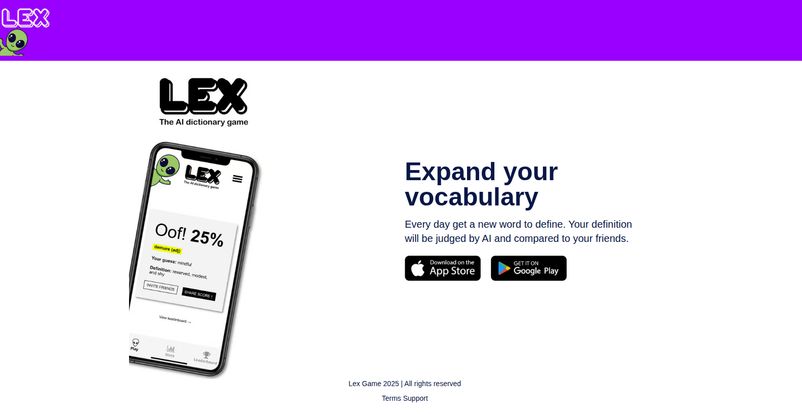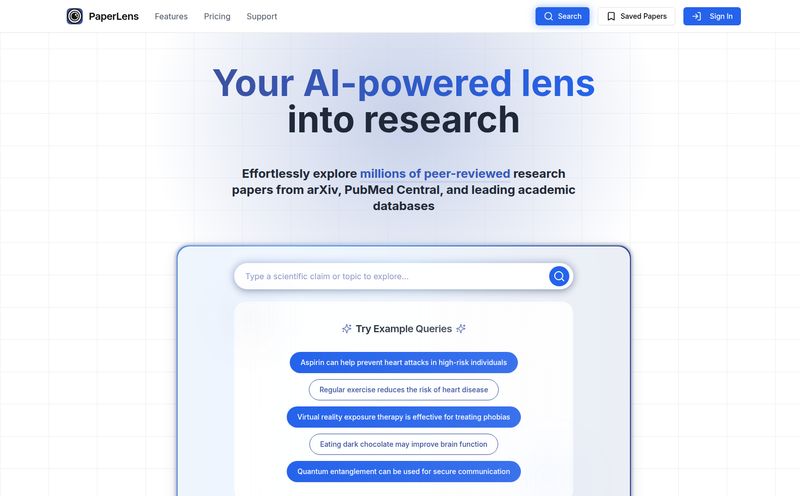My morning digital ritual has become a bit of a cliché. Coffee in hand, I knock out the Wordle, breeze through the NYT Connections, and maybe even tackle the Mini Crossword if I’m feeling particularly sharp. It’s a nice little brain warm-up. But lately, it’s all felt a bit… passive. Like I’m just rearranging letters someone else gave me.
Then a friend sent me a link to Lex. The tagline was simple: “The AI dictionary game.” I figured, sure, another word game. What’s the worst that can happen? Well, let me tell you, the worst that can happen is getting slapped with a 25% score and a condescending “Oof!” from a little green alien. My ego is still recovering.
So, What Exactly is This Lex Thing?
Forget guessing a five-letter word. Lex is a different beast entirely. Every day, the app serves you three new, often moderately obscure, words. Your job isn't to guess them, but to define them in your own words. Simple, right? Ha.
Once you’ve typed out your best attempt at a definition, you submit it to what the developers jokingly call the “AI overlords.” This AI then compares your definition to the word's actual meaning and slaps a score on it, from 0 to 100. It’s a daily dose of intellectual humility served up in a slick, minimalist interface. It's like having a tiny, slightly sarcastic linguistics professor in your pocket, and he’s not afraid to give you a failing grade.

Visit Dict
My First Encounter with the AI Overlords
My first word was “demure.” I thought, “Easy.” I’ve seen that word in a hundred Jane Austen novels. I typed something like, “To be quiet, polite, and modest.” I hit submit, feeling pretty smug.
The result? “Oof! 25%”
Twenty. Five. Percent. The app then showed me the actual definition and a list of synonyms like “reserved,” “meek,” and “shy.” Apparently, my definition wasn’t precise enough for our AI judge. It was both infuriating and, I have to admit, brilliant. It wasn't just about knowing the vibe of a word; it was about articulating its specific meaning. A skill I thought I had locked down after years of writing SEO content. Clearly, I have room for improvement.
The Good, The Bad, and The "Oof! 25%"
After playing for a couple of weeks, I've got a pretty good feel for Lex. The immediate feedback is addictive. You're not just told you're wrong; you're shown how wrong you are, which forces you to actually learn the word. It genuinely encourages critical thinking about language in a way multiple-choice quizzes never could. But its not perfect. The AI, while impressive, can be a bit finicky. Sometimes it seems to latch onto specific keywords rather than the overall sentiment of your definition, leading to some head-scratching scores. And being limited to only three words a day can feel a bit restrictive when you're on a roll. But maybe that’s the point—it leaves you wanting more.
Is Lex Just Another Wordle Clone?
It’s easy to lump Lex in with the tidal wave of daily puzzle games that came after Wordle’s success. They both have that one-a-day, share-your-score social component. But that’s where the similarities end. Wordle and its cousins are games of recognition and elimination. Lex is a game of production and articulation.
Why It's Actually Different (and Maybe Better for Pros)
Think about it. As SEOs, writers, or marketers, our job isn't just to recognize the right keywords. It’s to use them—and their synonyms and related concepts—with precision and nuance. We need to be able to explain complex topics clearly. Lex trains that exact muscle. It's one thing to know that “ephemeral” means short-lived. It’s another thing entirely to define it in a way that an AI agrees is 90% accurate. That’s a much higher-level skill, and frankly, one that’s far more applicable to our professional lives.
Beyond the Fun: How Lex Can Actually Sharpen Your SEO & Content Skills
I started playing Lex for fun, but I’ve kept playing it because I genuinely believe it’s making me better at my job. Every day, I’m forced to dig deep into the subtle differences between words. Why is “cajole” different from “persuade”? What’s the specific flavor of “melancholy” that separates it from just “sadness”?
This is the very essence of semantic SEO. Google’s algorithms are no longer just matching keywords; they're understanding topical context and user intent based on the constellation of words used in a piece of content. Getting a high score in Lex requires you to think in terms of synonyms, antonyms, and context—the same way you should when building a topic cluster or optimizing a piece of content for E-E-A-T (Experience, Expertise, Authoritativeness, and Trustworthiness). The better your command of language, the more authoritative and comprehensive your content will be. This little game is a surprisingly effective training ground.
Let's Talk Brass Tacks: Is Lex Free?
Yes. As of right now, Lex appears to be completely free. I scoured their website, lex.game, looking for a pricing page or subscription model, and came up empty (in fact, some of the sub-pages just give a 404 error, which is pretty common for new apps). It's available on both the Apple App Store and Google Play Store, and there are no paywalls or intrusive ads within the app itself. For a tool this polished, that’s pretty amazing. I’m sure they’ll figure out a monetization strategy down the line, but for now, you can jump in without spending a dime.
A Few Things to Keep in Mind
Before you dive in, just remember a couple of things. First, the AI isn’t a perfect, all-knowing being. It’s a tool. Sometimes you’ll write a brilliant definition and get a mediocre score. Don’t let it crush your spirit. The real value is in the process, not just the final number. Second, the three-word-a-day limit is both a pro and a con. It keeps the game from becoming a time-sink, but it also means you can’t binge-play. It’s a small, daily commitment to sharpening your mind.
Frequently Asked Questions about the Lex Game
How does the AI scoring in Lex actually work?
The app uses an AI model to perform a semantic comparison between your definition and the dictionary's definition. It’s not just looking for keywords, but trying to understand the actual meaning and nuance. It's complex, and sometimes a bit of a black box, but it's surprisingly accurate most of the time.
Is Lex available for both Android and iOS?
Yes, it is. You can find it on the Google Play Store for Android devices and the Apple App Store for iPhones and iPads.
Can I go back and play words from previous days?
Unfortunately, no. Much like Wordle, Lex is designed as a daily challenge. Once the day is over, those three words are gone. This adds to the urgency and makes it a consistent daily habit.
Is Lex a good tool for non-native English speakers?
It could be a great, if challenging, tool. It would be a true test of comprehension and articulation. However, the vocabulary can be quite advanced, so it might be more suitable for intermediate to advanced learners looking to perfect their language skills.
What's the little alien character's name?
The little green mascot is named Lex! He's your guide and, occasionally, your harshest critic through the game.
My Final Verdict: Should You Download Lex?
Absolutely. If you’re a writer, a marketer, an SEO, or just a bona fide word nerd, you need to try this game. It's more than just a fun distraction; it's a humbling, challenging, and genuinely useful tool for anyone who works with words for a living. It bridges the gap between passive vocabulary knowledge and active language mastery.
So go download it. See how you stack up against the AI overlords. And don’t feel too bad when you get your first “Oof!” We’ve all been there.
Reference and Sources
- The official Lex website: https://lex.game/
- Semrush Blog - What is E-E-A-T?: https://www.semrush.com/blog/what-is-e-e-a-t/



